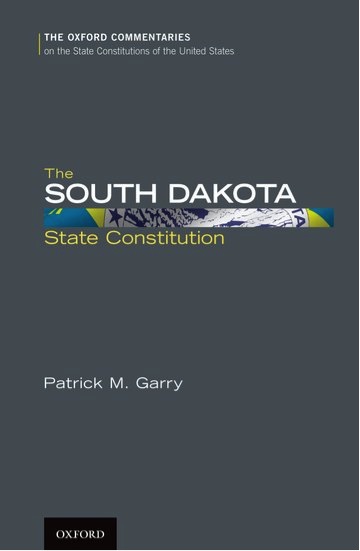THE SOUTH DAKOTA STATE CONSTITUTION
Description of The South Dakota State Constitution
South Dakota was the first state in the nation’s history to adopt the Initiative and Referendum, making it permissible for the people to initiate a constitutional amendment, on a statewide level in 1898. While it continues to be a controversial procedure, Patrick Garry discusses this in-depth while providing the only definitive reference resource on the South Dakota Constitution, including all significant court decisions interpreting each Section.
The South Dakota Constitution features the rich history and development of constitutionalism in the state. It provides the complete text of the state’s current constitution, with each section accompanied by commentary that explains the provision and traces its origins and its interpretation by the courts and by other governmental bodies. Offering in-depth, section-by-section analysis of the entire constitution, it shows the many significant changes within the state of South Dakota that have been made since the constitution’s initial drafting. The book concludes with a bibliography, a table of cases cited in the volume, and a topical index making this volume a highly detailed historical companion for students, scholars, practitioners, and all readers interested in state constitutional issues and the history of South Dakota’s statehood.
The Oxford Commentaries on the State Constitutions of the United States is an important series that reflects a renewed international interest in constitutional history and provides expert insight into each of the 50 state constitutions. Each volume in this innovative series contains a historical overview of the state’s constitutional development, a section-by-section analysis of its current constitution, and a comprehensive guide to further research.
Under the expert editorship of Professor G. Alan Tarr, Director of the Center on State Constitutional Studies at Rutgers University, this series provides essential reference tools for understanding state constitutional law. Books in the series can be purchased individually or as part of a complete set, giving readers unmatched access to these important political documents.
Reviews of The South Dakota State Constitution
State constitutions play a crucial role in the political and legal life of the states, as Professor Garry’s excellent volume demonstrates.In clear, readable prose, his book provides a thorough account of South Dakota’s constitutional history and an expert assessment of its Constitutional law. This is simply the best account we have of South Dakota constitutionalism, and it is likely to remain the authoritative source for years to come.
– Professor G. Alan Tarr, Director of the Center on State Constitutional Studies at Rutgers University
The South Dakota Constitution has been held by the South Dakota Supreme Court to be the “Mother Law” of the State. In many ways it has a more direct effect on the daily lives of South Dakotans than does the United States Constitution. Yet anyone attempting to research the origin and potential meanings of the document or portions of it often faced a daunting task. There were snippets here and there concerning the document but no central volume to assist in this important research. Moreover, many of the earlier works on South Dakota’s Constitution were long out of print and very difficult to locate.
Professor Garry for the first time brings forth a systematic study of the entire document and its origins. This will be an invaluable aid to the researcher, the scholar and the bench and bar.
-The Honorable David Gilbertson, Chief Justice, South Dakota Supreme Court
Our State Constitution is the fundamental document of state law governing the day-to-day relationship between our government and the people. Professor Garry’s The South Dakota State Constitution provides an excellent introduction into the history behind our Constitution and how its provisions have been applied. This book is a great resource for citizens who want to become more informed about a document that protects them and impacts their daily lives.
-The Honorable Marty Jackley, Attorney General, State of South Dakota
Patrick Garry has written an explanatory history, as well as a comprehensive clause-by-clause analysis, of the South Dakota Constitution. His analysis of the document discusses pertinent state and federal court decisions as well as relevant initiatives and referendums. The work is comprehensive, clearly written, accessible, judicious and definitive–in short, this book contains everything the reader would desire in a work of its type. I expect it will become an indispensable guide to South Dakota’s Constitution for members of the bar, historians, students and interested citizens alike.
-Peter Schotten, Professor of Government and International Affairs/Political Science, Augustana College, Sioux Falls, SD
The bench and bar of South Dakota and the surrounding region will be richly rewarded by reading Patrick Garry’s authoritative account of South Dakota’s founding moment and the forging of its fundamental law. Garry’s work is destined to become a classic.
–Jon K. Lauck, author of Prairie Republic
Patrick Garry’s “The South Dakota State Constitution,” is a wonderful text for anyone interested in the state’s government. Legal practitioners will find analysis of constitutional provisions that commercial databases do not provide. Engaged citizens will find the text, its constitutional history of enactment and amendment, its intended purpose, what the provision means to the citizenry, and significant judicial interpretations.
Garry’s text invites us to explore the provisions of the state’s fundamental law, its constitution. The reader will find the meaning and significant case law relating to individual sections. More than a reference book, Garry helps citizens understand how this law came to be, why there are individual liberties and limits on government action that are different than what is provided in the US Constitution and the necessity of citizen participation in our government.
-Michael Card, Professor of Political Science, University of South Dakota

